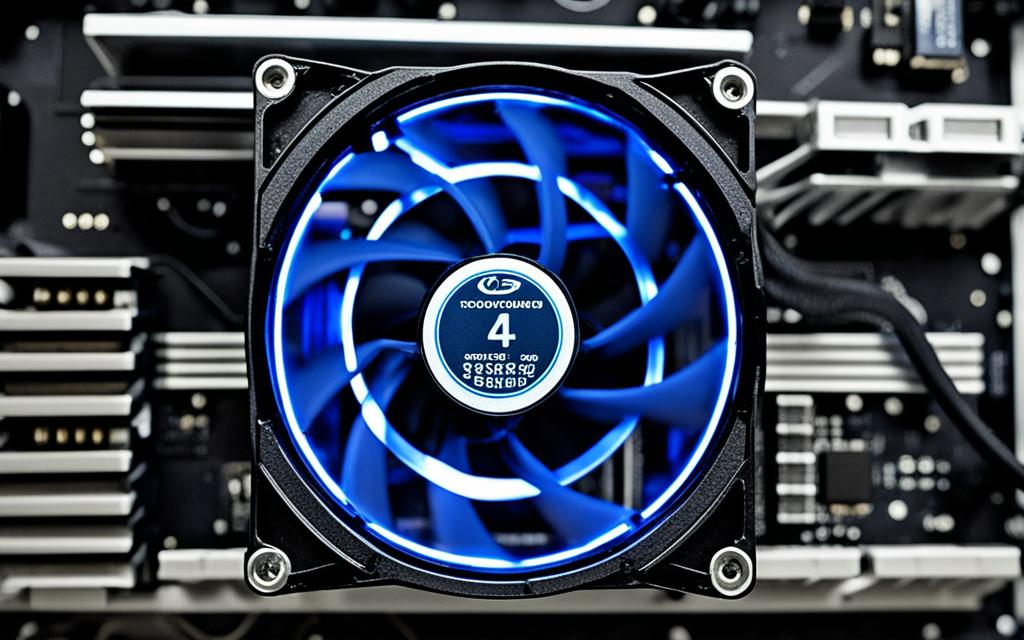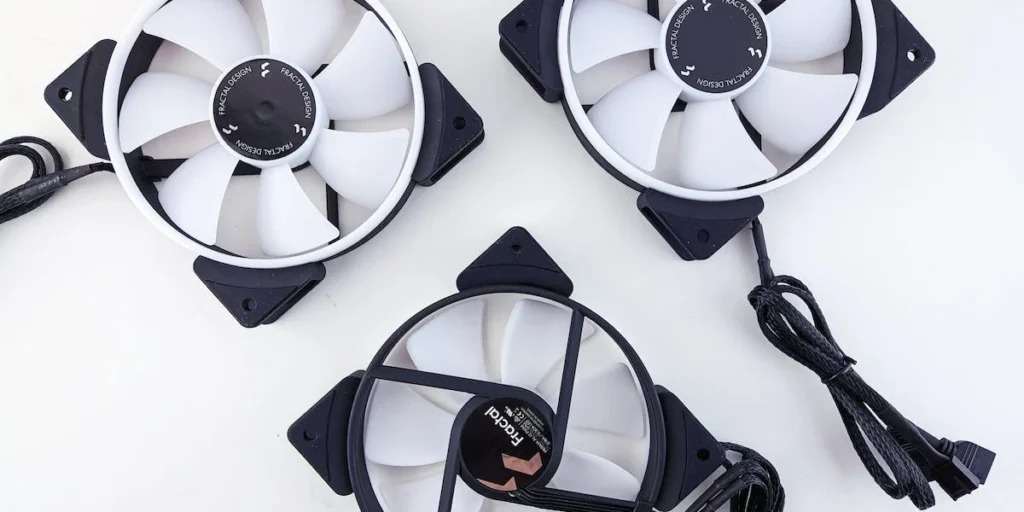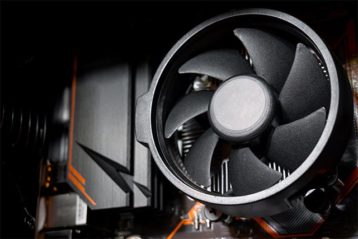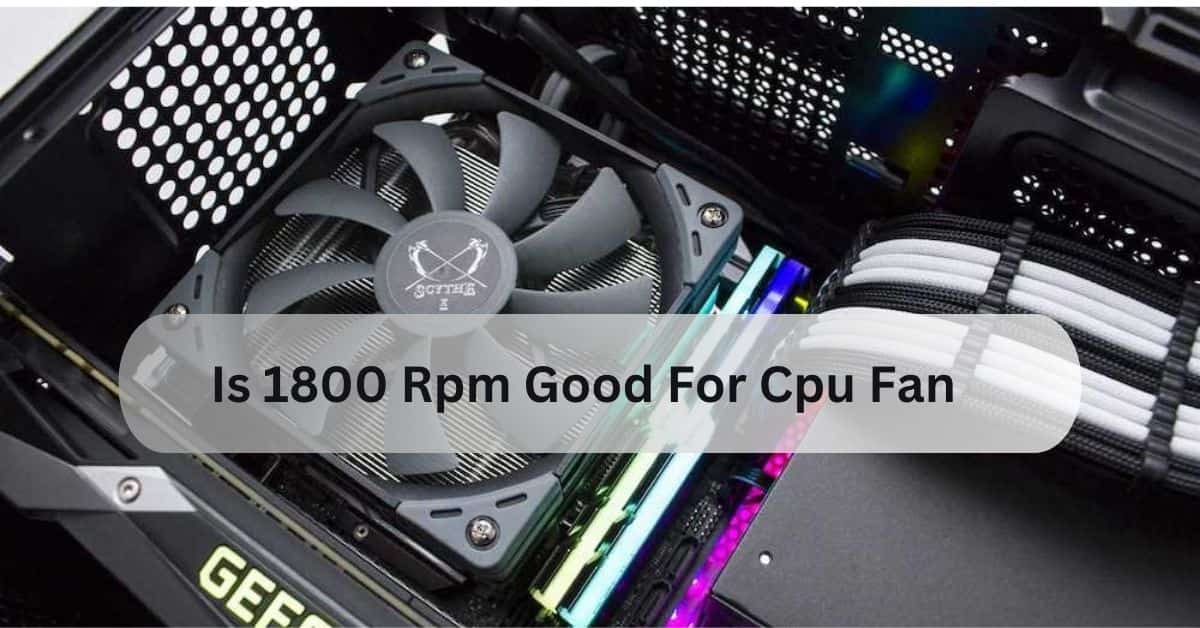CPU fan is 1800 rpm good for cpu fan has worked really well for everyday tasks. It keeps my system cool without being too loud, so I can work or game without distractions. It’s not the fastest, but for most things, it’s more than enough.
Yes, is 1800 rpm good for cpu fan providing a solid balance between effective cooling and low noise levels, suitable for most everyday tasks.
is 1800 rpm good for cpu fan Absolutely-it’s a great balance, offering effective cooling without making too much noise, ideal for most setups.
Is 1800 Rpm An Effective Speed For A Cpu Fan?

Yes, 1800 RPM is generally effective for a CPU fan. It provides enough airflow to keep most CPUs cool during everyday tasks and moderate gaming, while also being relatively quiet.
For high-performance or overclocked CPUs, you might need a fan with a higher RPM or extra cooling, but 1800 RPM works well for most regular use.
Can A Cpu Fan Running At 1800 Rpm Handle Overclocking?
A CPU fan running at 1800 RPM can handle light to moderate overclocking, but its effectiveness depends on how much you’ve pushed your CPU. For small boosts in performance, 1800 RPM usually provides enough cooling.
if you’ve overclocked significantly or if your CPU generates a lot of heat, you might need a faster fan or extra cooling to keep temperatures in check. Always check your CPU temperatures to make sure they stay within safe limits.
Is 1800 Rpm Suitable For A High-Performance Gaming Pc?
- Cooling Performance: An 1800 RPM fan can provide adequate cooling for a high-performance gaming PC during most gaming sessions. It can handle the heat generated by gaming at moderate settings.
- Temperature Control: For many gaming PCs, 1800 RPM helps keep the CPU temperatures within a safe range. However, if you’re running games that push the CPU to its limits or if your system is overclocked, you might need more cooling.
- Noise Levels: Fans at 1800 RPM are relatively quiet, which is beneficial for a gaming setup where noise can be distracting. This speed offers a good balance between cooling and sound.
- System Demands: If you experience high temperatures or if your gaming PC includes high-end components that produce a lot of heat, you may need a fan with a higher RPM or additional cooling solutions to ensure optimal performance.
- Monitoring: Keep an eye on your CPU temperatures during intense gaming. If temperatures rise too high, consider upgrading to a fan with a higher RPM or adding more cooling options.
What Noise Levels Should I Expect From A Fan Running At 1800 Rpm?

A CPU fan running at 1800 RPM generally produces a moderate amount of noise. It won’t be completely silent, but it should be quiet enough for most users in a typical home or office setting.
The exact noise level can vary depending on the fan’s design and quality, but you can expect it to be noticeable only in a quiet room. It’s a good balance between cooling efficiency and noise, making it a comfortable choice for those who want effective cooling without too much distraction from fan noise.
Read Also: Cpu Core Ratio Sync All Cores Or Auto – Boost Core Efficiency!
Can 1800 Rpm Be Enough For A Cpu With A High Tdp?
1. Cooling Efficiency:
At 1800 RPM, a fan provides moderate cooling. For CPUs with high TDP (which generate more heat), this might be sufficient if the fan is well-designed and the system has good airflow. However, if the CPU generates a lot of heat, the fan might struggle to keep temperatures low at 1800 RPM.
2. CPU Model and Usage:
High-TDP CPUs, often found in gaming rigs or workstations, can produce a lot of heat, especially under heavy loads like gaming or video editing. In such cases, 1800 RPM might not be enough to maintain optimal temperatures, and the CPU could throttle (reduce performance) to avoid overheating.
3. Additional Cooling Solutions:
If your CPU has a high TDP and your fan is running at 1800 RPM, adding more case fans, improving airflow, or using a more efficient heatsink or liquid cooling system can help. These measures can compensate for the lower fan speed and ensure your CPU stays cool.
How Does 1800 Rpm Compare To Higher Rpm Fans For Cooling Performance?
An 1800 RPM fan strikes a good balance between cooling and quiet operation, making it ideal for everyday use. However, when compared to higher RPM fans, it doesn’t cool as effectively, especially in demanding situations.

Higher RPM fans move more air, which helps keep the CPU cooler under heavy workloads, but they are also louder. So, while an 1800 RPM fan is often sufficient, higher RPM fans offer better cooling for those who need maximum performance, though they come with more noise and energy use.
Is 1800 Rpm A Good Balance Between Cooling Efficiency And Noise?
Yes, 1800 RPM is a good balance between cooling efficiency and noise. It provides enough airflow to keep your CPU cool during regular tasks, while still being quiet enough to avoid any noticeable distraction. This speed is ideal for those who want effective cooling without dealing with loud fan noise, making it a great choice for most everyday computing needs.
How Does 1800 Rpm Affect The Lifespan Of A Cpu Fan?
- Moderate Wear: Running a fan at 1800 RPM causes moderate wear on the motor and bearings, which is generally manageable and won’t significantly shorten the fan’s lifespan.
- Balanced Operation: At 1800 RPM, the fan operates at a speed that balances cooling needs with less strain, helping to extend its overall durability.
- Less Heat Buildup: The fan can effectively cool components without overworking, reducing the risk of overheating the fan itself and prolonging its life.
- Reduced Noise and Vibration: Lower speeds like 1800 RPM generate less noise and vibration, which can contribute to a longer lifespan compared to higher RPMs.
FAQS:
1. Is 1800 RPM good for a CPU fan in a mini-ITX build?
Yes, 1800 RPM is effective in compact builds like mini-ITX, where cooling and space are crucial.
2. Is 1800 RPM good for a CPU fan during rendering?
For most rendering tasks, 1800 RPM provides adequate cooling, though intensive tasks might need higher speeds.
3. Is 1800 RPM good for a CPU fan in a mid-range PC?
Yes, 1800 RPM is ideal for mid-range PCs, balancing cooling efficiency and noise.
4. Is 1800 RPM good for a CPU fan in a desktop replacement laptop?
Yes, it’s a suitable speed for desktop replacement laptops, ensuring good cooling without excessive noise.
5. Is 1800 RPM good for a CPU fan in a fanless case?
If used with other cooling methods, 1800 RPM can be sufficient, but fanless cases often need additional cooling strategies.
Conclusion:
is 1800 rpm good for cpu fan is generally a good choice for a CPU fan, offering a balanced combination of effective cooling and low noise levels suitable for most everyday computing tasks. It provides sufficient airflow for average workloads, keeping your CPU cool without being excessively loud.
